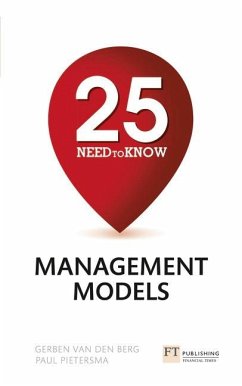
Key Management Models
The 75+ Models Every Manager Needs to Know
Versandkostenfrei!
Versandfertig in 2-4 Wochen
48,99 €
inkl. MwSt.
Weitere Ausgaben:

PAYBACK Punkte
24 °P sammeln!
This best selling management book is a true classic. If you want to be a model manager, keep this new, even better 3rd edition close at hand. Key Management Models has the winning combination of brevity and clarity, giving you short, practical overviews of the top classic and cutting edge management models in an easy-to-use, ready reference format. Whether you want to remind yourself about models you’ve already come across, or want to find new ones, you’ll find yourself referring back to it again and again. It's the essential guide to all the management models you’ll ever need to know ab...
This best selling management book is a true classic. If you want to be a model manager, keep this new, even better 3rd edition close at hand. Key Management Models has the winning combination of brevity and clarity, giving you short, practical overviews of the top classic and cutting edge management models in an easy-to-use, ready reference format. Whether you want to remind yourself about models you’ve already come across, or want to find new ones, you’ll find yourself referring back to it again and again. It's the essential guide to all the management models you’ll ever need to know about. 1. Includes the classic and essential management models from the previous 2 editions. 2. Thoroughly updated to include cutting edge new models. 3. Two-colour illustrations and case studies throughout.













